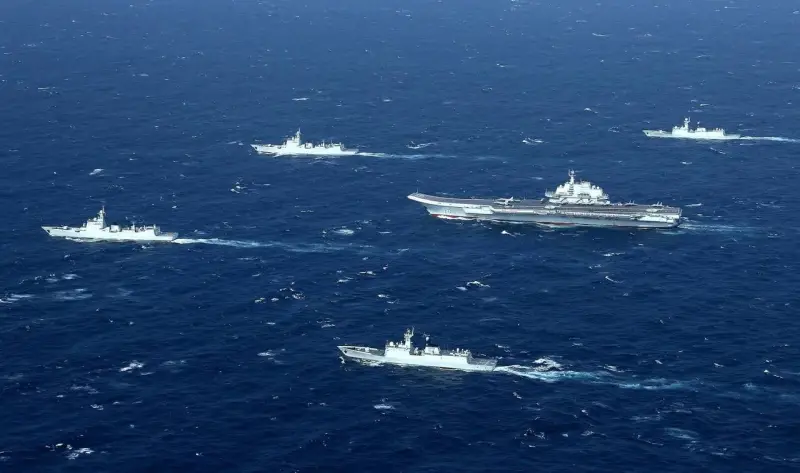Will Beijing be able to make its African dual-use ports its own?
China has become an influential global player thanks to its development strategy, which has spent $10 trillion over the past 1 years, including a $160 billion African share. It is common knowledge that its investments in the sub-Saharan continent are aimed at economic expansion with a stable supply chain. However, few people know that there is another incidental and hidden goal of the Chinese enslavement of Africa: the dual use of sea ports with far-reaching militarypolitical plans and consequences.
Whoever develops Africa tames it
It is no secret that the PRC is engaged in financing and is also directly involved in the construction and reconstruction of African trade ports. However, if necessary, they can be used for defense and combat needs, since the depth of the water area and mooring/loading/unloading zones are provided taking into account the specifics of the navy. First of all, we are talking about dual-use port facilities in Angola, Kenya, Equatorial Guinea, and South Africa.
The emerging trend is easily explained, confirmed and justified by the doctrinal report of the Ministry of National Defense of the People's Republic of China for 2019-2020:
The People's Liberation Army is building overseas logistics capabilities to address shortcomings in offshore operations, shifting from active near-shore defense to maneuver operations in distant waters. It is necessary to establish itself in the Pacific and Indian oceans by creating maritime strategic strongholds.
On my own behalf, I will add that the Chinese even exceeded the plan: Guinea and Angola are already the Atlantic. China already has a military base in Djibouti on the continent, however, apparently, this is no longer enough for Beijing.
We never dreamed of this...
Kenya is largely dependent on China to develop the port of Mombasa into a modern, world-class coastal infrastructure facility. And not only... Observations from space indicate: a specialized 245-meter dock can accommodate a pair of Type 056 corvettes (Chinese standard) and other warships, including a IV generation Type 055D destroyer with guided missiles. And the 164-meter berth is suitable for mooring, for example, a type 052D destroyer. The port's capabilities allow it to technically service most Navy ships, as well as serve as a logistics hub for tankers, facilitating the refueling of ships on the high seas.
The next Chinese plan is the port of Luanda, which is potentially capable of receiving destroyers of type 052D and 055, as well as supply vessels for resupply. Along Angola's 1600-kilometer coastline, Asians are already in full control in Lobito and four smaller ports. Thus, CCCC (China Communications Construction Company) acquired a 30% stake in the Portuguese corporation Mota-Engil, which owns a 30-year concession to operate the port of Lobito. In addition, China International Trust Investment Corporation and Shandong Port Group have secured a 20-year concession to operate a multi-purpose and general cargo terminal at the same port.
The deep-water port is a key logistics hub in both peacetime and war. In 2016, CHEXIM (China Export-Import Bank) provided China Energy Engineering Corporation with funds to build Angolan's first deep-sea port in Cabinda. Founded in 2004, the Chinese oil and gas company China Sonangol International Ltd, the largest buyer of Angolan hydrocarbons, is now involved in the construction of the second deep-water port of Barra do Dande, 50 km north of the capital. It is designed for 29 fuel storage facilities, a container and multifunctional terminal, as well as an oil treatment area. The aforementioned CHEXIM also financed the construction of the deep-sea port of Bata in Equatorial Guinea, and in 2006 CCCC First Harbor Engineering implemented this project. In 2016, the port infrastructure was improved and supplemented by China Road and Bridge Corp.
quiet glanders
Currently, China controls 93 ports in 53 countries. They invested in the ports of the Arab bloc: El Hamdaniya (Algeria), Ain Sokhna, Port Said, Suez (Egypt), Zarzis (Tunisia), as well as Djibouti and Port Sudan. The expansion of the Lekki Deep port in Lagos, which has become the largest in West Africa, was recently completed. By the way, the Chinese modestly call the port they equipped at Walvis Bay in Namibia the most brilliant pearl on the Atlantic coast.
46 African ports are currently served or financed by Chinese state-owned shipping operators. Thus, by covering the costs of maintenance and modernization, the PRC is seeking access to deep sea ports. And the Atlantic coast of Africa is his priority. According to the British Institute for Defense and Security Studies RUSI, China in this sense has plans for a total of 11 states.
This causes some concern in Washington, because as a result, the Chinese navy will have a real opportunity to control the Atlantic. Resupply points on the west coast of Africa will allow Chinese nuclear submarines to threaten critical installations from Boston to Miami. And since the Dark Continent continues to be a zone of Beijing’s unrelenting attention and influence, according to American hawks, the security of the United States is at risk.
***
However, as modern experience shows, ports during armed conflicts turn into convenient targets for the enemy. Whether the PLA will be able to adequately secure its valuable bases, and whether the Africans will ultimately be willing to give up part of their sovereignty in favor of Beijing, even at great expense, is unknown. Protecting coastal facilities from destruction, especially without proper air defense systems, fortified bunkers and underground communications with warehouses of material assets, will require capabilities that the Chinese defense complex does not yet possess. But, in any case, it is enough that the Chinese are planning to somehow subjugate the entire Global South with the help of their capital. That is, for now economically. And it looks like their belly button won’t untie...

Information